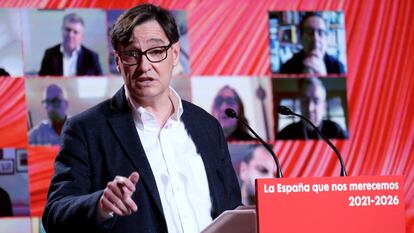In midst of third coronavirus wave, Spain’s health minister to bow out and run in Catalan elections
The Socialist Party’s decision to remove Salvador Illa from his role has been controversial given the ongoing health crisis, and has been subject to fierce criticism from the political opposition

Spain’s central government on Monday officially confirmed that the current health minister, Salvador Illa, will leave his role this week and that tomorrow’s Cabinet meeting will be his last. Illa, who has been in charge of the Health Ministry for just over a year, will be running as the candidate for the Catalan Socialist Party (PSC) in the upcoming elections in the northeastern region, which are due to be held on February 14.
The decision is a controversial one, given that he will be leaving the government in the midst of the third wave of the coronavirus pandemic in Spain. Illa has, however, met his promise of remaining in the role until the start of the electoral campaign, which will officially begin on Thursday.
The most likely person to replace Illa is Carolina Darias, currently the territorial policy minister
His successor as health minister will assume the role on Wednesday. The most likely person to replace Illa is Carolina Darias, currently the territorial policy minister. Darias has also been in the spotlight during the ongoing health crisis and for weeks has been the government representative who speaks to the press after meetings of the Inter-Territorial Council of the National Health System (CISNS), which brings together the regional health departments and the central Health Ministry to coordinate the handling of the pandemic in Spain.
Government sources have suggested that Darias, in turn, will be replaced by Miquel Iceta, who is currently the head of the PSC and will be relieved by Illa. However, there has been no official confirmation of this. The handover is likely to be announced after Tuesday’s Cabinet meeting, and the ministers will be sworn in the following day.
The same sources, however, have suggested that there will be no further reshuffling of the Cabinet. The Spanish government is a coalition of the Socialist Party (PSOE) along with junior partner Unidas Podemos. The latter party is not expected to take advantage of these changes to relieve any of its five ministers. Prime Minister Pedro Sánchez is also apparently unwilling to make changes in a Cabinet that has been in place for just over a year. That said, the majority of his ministers have been in their roles for longer, since Sánchez took power in the summer of 2018 after tabling a successful motion of no-confidence in the Congress of Deputies against then-Popular Party Prime Minister Mariano Rajoy. Many of Sánchez’s ministers have been in their roles for more than two-and-a-half years and some have been involved in major controversies that have depleted their political capital.
Sánchez’s decision to keep Illa in his Health Ministry role has come in for major criticism from the political opposition – his candidacy in the Catalan elections was announced on December 30. But from La Moncloa prime ministerial palace, sources stated that “the planned calendar is being met, which involved Illa’s exit from the ministry before the election campaign began the following Friday.”
Unusual campaign
Illa will be facing an unusual campaign, which could see the PSC win the most votes in Catalonia. This appeared a pipe dream just a few weeks ago but now looks possible according to the latest polls. Even if he should win, however, wresting power from the pro-independence parties may prove difficult if the PSC falls short of an absolute majority. The Catalan Republican Left (ERC), which currently governs in Catalonia in coalition with Junts per Catalunya (Together for Catalonia), is unlikely to support the investiture of a socialist rather than a pro-Catalan independence candidate. Illa’s candidacy has already put relations between the ERC and the central government under strain. The coalition is governing with a minority in Congress and as such the government has relied on the support of the ERC both in terms of Sánchez’s victory at the aforementioned motion of no confidence in 2018, the formation of the current government and the recent approval of a new budget.
English version by Simon Hunter.
Tu suscripción se está usando en otro dispositivo
¿Quieres añadir otro usuario a tu suscripción?
Si continúas leyendo en este dispositivo, no se podrá leer en el otro.
FlechaTu suscripción se está usando en otro dispositivo y solo puedes acceder a EL PAÍS desde un dispositivo a la vez.
Si quieres compartir tu cuenta, cambia tu suscripción a la modalidad Premium, así podrás añadir otro usuario. Cada uno accederá con su propia cuenta de email, lo que os permitirá personalizar vuestra experiencia en EL PAÍS.
¿Tienes una suscripción de empresa? Accede aquí para contratar más cuentas.
En el caso de no saber quién está usando tu cuenta, te recomendamos cambiar tu contraseña aquí.
Si decides continuar compartiendo tu cuenta, este mensaje se mostrará en tu dispositivo y en el de la otra persona que está usando tu cuenta de forma indefinida, afectando a tu experiencia de lectura. Puedes consultar aquí los términos y condiciones de la suscripción digital.








































